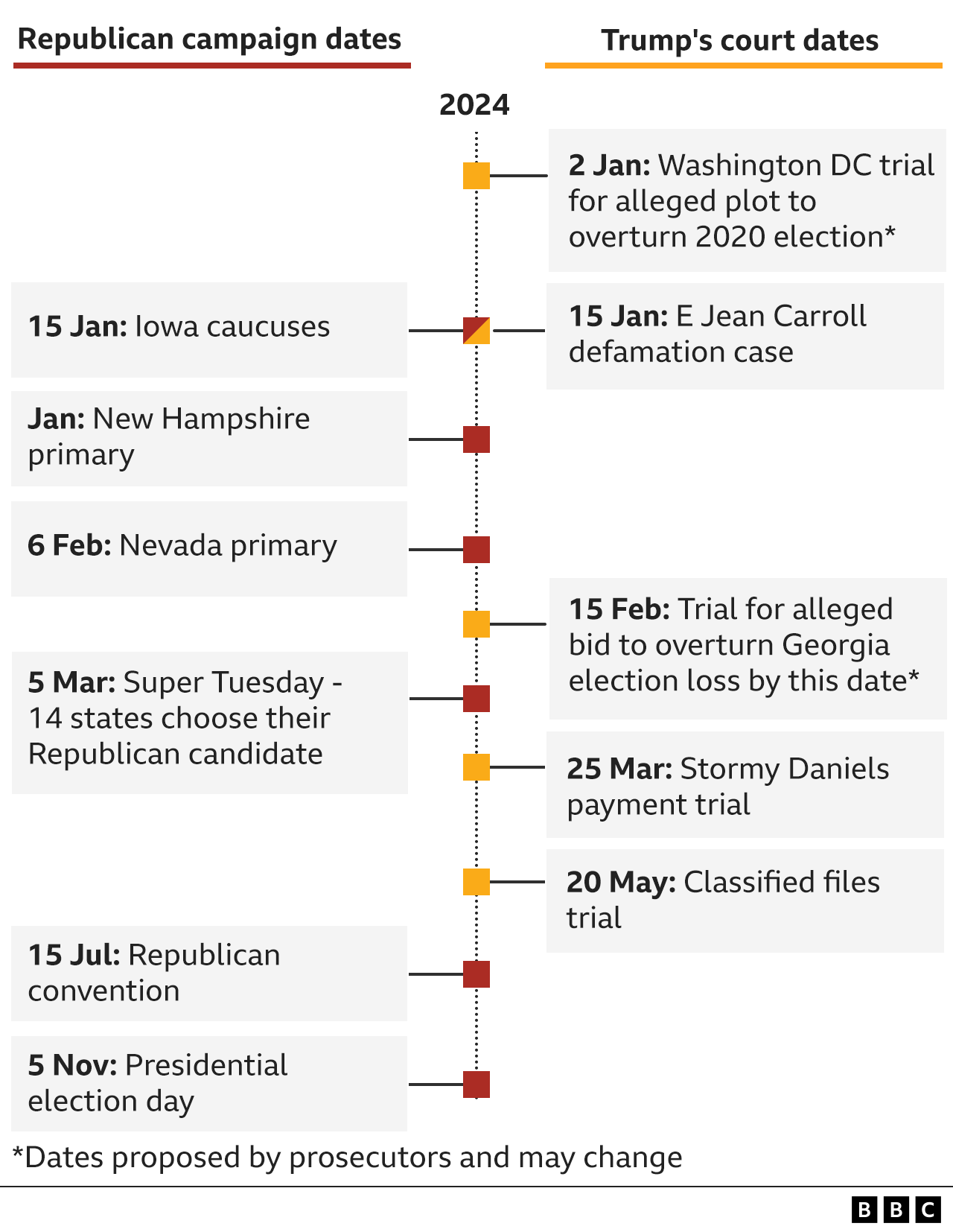A Georgia special grand jury recommended charging one current and two former US senators and 18 other allies of ex-President Donald Trump, a newly released report says.
But prosecutors decided not to indict them for alleged efforts to reverse the 2020 election results in the state.
The jury had voted to recommend indictments against Republican Senator Lindsey Graham and former Senators Kelly Loeffler and David Perdue.
The full report was released on Friday.
The document, much of which was previously under seal, offers the clearest picture yet of the secret jury’s thinking as they investigated whether Mr Trump and his allies broke the law in Georgia during the 2020 US presidential election.
That investigation culminated in the criminal charges that were brought against Mr Trump and 18 co-defendants last month for an alleged conspiracy to overturn the election results.
All have pleaded not guilty to the charges.

This report, which was posted online, sheds light on who else was investigated and how close they came to being prosecuted.
In total the special grand jury recommended charges against 39 people. Eventually 19 people, including Mr Trump, were charged.
The panel spent seven months interviewing about 75 witnesses. They had broad investigative powers and could recommend charges based on their findings – but did not have the power to indict.
The grand jury report shows the breakdown of each vote to recommend charges against the major figures caught up in the investigation, including Mr Trump.
But the actual document shows dissent among the 23-member panel.
Donald Trump: “I just want to find 11,780 votes”
Two jurors voted against recommending charges for individuals accused of posing as false electors. They believed they had been “misled to understand what was their civic duty”.
While nearly all were in agreement to charge Mr Trump and his top attorneys, including Rudy Giuliani and John Eastman, there was a more pronounced split about whether to charge the senators.
Footnotes included beneath each vote give a glimpse into their disagreements. The splits could portend challenges for prosecutors at an eventual trial, where a jury must vote unanimously to convict.
The report notes that one dissenting juror believed Ms Loeffler and Mr Perdue were “pandering to their political base” when they made false statements about the election results as they were running for re-election, but that did not necessarily make them “guilty of a criminal conspiracy”.
The relatively bare-bones report does not specify the actions each senator took that would incur possible charges. But much is known about their public statements and private actions in the aftermath of the 2020 election.
Both Mr Loeffler and Mr Perdue were up for re-election in 2020. They publicly backed Mr Trump’s attempts to challenge the results of the presidential race and repeated unfounded claims that widespread fraud had potentially occurred.
Recounts and audits found no such fraud in Georgia and confirmed Joe Biden had won the state.
Ms Loeffler defended her actions in a statement on Friday, claiming she was “speaking out in defence of election integrity”.
Ms Willis had also scrutinised a call that Mr Graham made to the state’s top election official shortly after the election, as well as other actions.
He had called Georgia Secretary of State Brad Raffensperger to ask whether certain postal ballots could be thrown out, the Washington Post reported.
Mr Graham denied the accusations on Friday, saying that when he called Mr Raffensperger he was simply doing his job and inquiring over a legitimate concern of potential voter fraud.
“I feel comfortable with the questions I asked,” he said. “At the end of the day, I did my job.”
Mr Graham repeatedly framed the charges against Mr Trump and the recommended indictment against him as politically motivated.
Mr Perdue’s office did not immediately respond to requests for comment.
Some additional major figures not indicted include his former National Security Adviser Michael Flynn, attorney and aide Boris Epshteyn, and lawyer Cleta Mitchell.
In a statement on Friday on his social network Truth Social, Mr Trump said the grand jury report had “zero credibility”, adding that jurors wanted to “indict anybody who happened to be breathing”.
Fulton County District Attorney Fani Willis created the special grand jury soon after the 2020 US presidential election. Unlike a typical grand jury, this body had investigative powers.
The panel was selected in May 2022 and turned in its final report in January. Much of it has remained under seal until now.
Ms Willis created a second, typical grand jury this summer, which voted to indict Mr Trump and the 18 co-defendants in a sweeping racketeering case.
The indictment alleges the 19 worked together in order to unlawfully overturn the results of the 2020 election by pressuring Georgia election officials, harassing poll workers, and organising a slate of false electoral college members to submit a false vote for Mr Trump.
Mr Trump, the current frontrunner for the 2024 Republican presidential nomination, has been criminally indicted four times, including in the Georgia case.
He has repeatedly denounced the prosecutions as politically motivated, deliberately aimed at derailing his presidential ambitions.

Source: BBC
